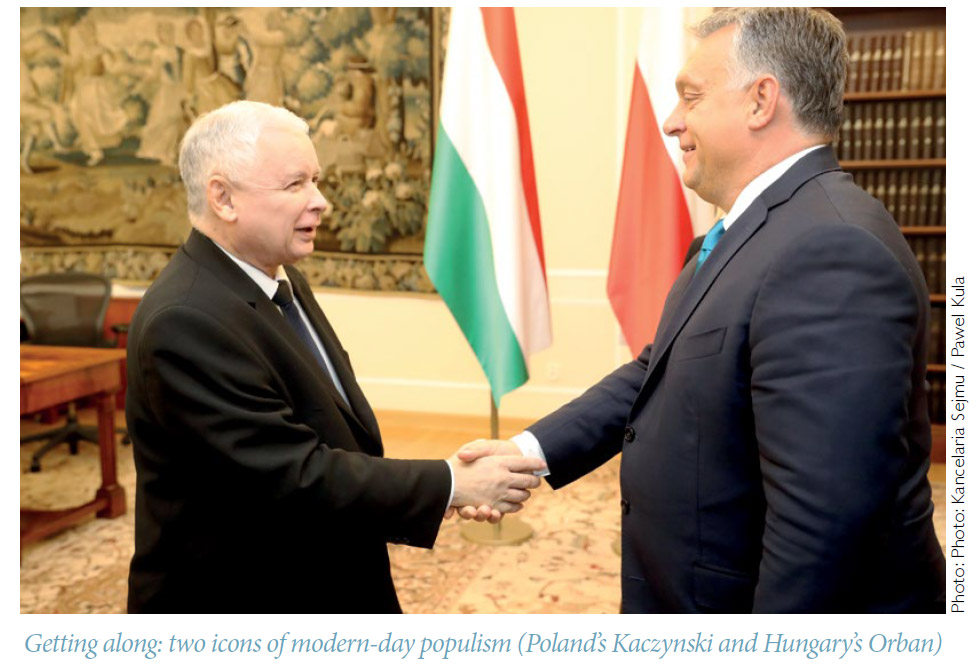
 Johannes Plagemann is Research Fellow at the German Institute of Global and Area Studies (GIGA) and Deputy Professor of Political Science at Goethe University in Frankfurt. Sandra Destradi is Lead Research Fellow at the German Institute of Global and Area Studies (GIGA) and Professor of International Relations at Helmut Schmidt University / University of the Federal Armed Forces in Hamburg. This essay is based on research published in the Review of International Studies. You may follow her on Twitter @SDestradi.
Johannes Plagemann is Research Fellow at the German Institute of Global and Area Studies (GIGA) and Deputy Professor of Political Science at Goethe University in Frankfurt. Sandra Destradi is Lead Research Fellow at the German Institute of Global and Area Studies (GIGA) and Professor of International Relations at Helmut Schmidt University / University of the Federal Armed Forces in Hamburg. This essay is based on research published in the Review of International Studies. You may follow her on Twitter @SDestradi.
Populism is a global phenomenon. From Donald Trump and Rodrigo Duterte to Victor Orban and Jair Bolsonaro, populist leaders have entered government and are now in the position to shape their respective countries’ foreign policies.
Yet political science research is still undecided about the exact consequences of populists’ rise to power has for foreign policy and international relations more broadly. While there are a host of scholars now working on the topic with exciting new research to be published soon, existing scholarship is scant and often over-reliant on news analyses, individual cases (the American one in particular), and anecdotal evidence.
Scholarship and reporting also exhibit a certain regional bias. Whereas in the past, debates about populism were largely confined to Latin Americanists, the rise of Trump, Brexit, and the prevalence of populist forces in European politics more broadly shifted attention to the origins and consequences of populism in the Western world. Yet populism is widespread beyond America and Europe. Politicians like India’s Narendra Modi, Turkey’s Recep Tayyip Erdoğan or even Venezuela’s Hugo Chávez have been hugely successful in forming electoral bases on the back of their personal appeal amplified by a superior use of media (and social media, in the case of India), and anti-elitist discourses.
Thin Ideology
However, not all politicians criticizing established elites are populists. Nor is the use of social media for political mobilization exclusive to populists. In order to assess its consequences, a clear understanding of what populism necessarily entails is warranted. In following Dutch political scientist Cas Mudde and others, populism can be understood as a “thin ideology” consisting of two central elements: anti-elitism and a centrality of “the people,” which leads to anti-pluralism.

Anti-elitism captures populists’ habitual references to a corrupt and denigrated establishment (Trump’s “drain the swamp”) working against the interest of the majority. The centrality of the people refers to populists’ characteristic construction of an undivided “true people” complete with an undivided general will. By claiming to be the only actors who can legitimately speak in the name of such “true people,” populists denigrate political opponents and are therefore anti-pluralist. The populist discourse typically refers to principles of “common sense” and the interest of the common man, often embodied in the populist leader himself. Moreover, populists dwell on a fundamental and binary conflict between good and evil, the interest of the true people and those of the corrupt elite. Such dichotomy—due to its essentially normative character—necessarily complicates forging political compromises.
In addition to such a thin ideology, populists typically adopt or, indeed, emerge from more fully-fledged political ideologies such as socialism or ethno-nationalism. For instance, whereas Modi in India is committed to his party’s Hindu nationalism, Chávez in Venezuela forcefully called for the establishment of a “socialism of the twenty-first century.” Called “thick ideologies” to distinguish them from populism’s leaner ideational content, these political ideologies in many cases have more direct consequences for foreign policy than the respective governments’ character as populists.
What then are the consequences of populism on foreign policy then? In other words, how do populists’ foreign policies differ from those of their non-populist predecessors in government in terms of substance and process?
Based on observations from a range of cases from the Global South as well as Europe and the United States, we argue that two consequences stand out. The first refers to the content of foreign policy, the other to the process of foreign policymaking. Both elements are important for a better understanding of—and more foresighted dealings with—populists in power.
Diversification
Arguably, the most remarkable similarity in the foreign policy agendas pursued by populists in power consists in a diversification of international partnerships. In some cases, this appears to be renunciation of the West, its alliance system, or even the “liberal international order” at large.
At the beginning of his premiership, Erdoğan worked towards advancing Turkey’s EU membership—a long-established goal of Ankara’s foreign policy. As he became more populist over time, he turned away from the EU and, with the import of Russian missile defense, at least partially from NATO, too.
Rodrigo Duterte in the Philippines changed his country’s foreign policy course radically by way of downplaying a 2016 ruling of the Permanent Court of Arbitration in The Hague that justified his country’s territorial claims in the South China Sea vis-à-vis China—a long-standing foreign policy goal. Instead, during his first visit to China in the same year, Duterte proclaimed a closer partnership with Beijing.
Prior to Chávez’ ascendance to power in 1999, the United States was both Venezuela’s largest buyer of oil and most important weapons provider. As president, Chávez famously called George W. Bush a “donkey” and forged closer relations with American adversaries like Russia, Cuba, and China. Today, most of Venezuela’s military equipment comes from Russia.
But the West also provides for interesting illustrations. Italy under the pan-populist Five Star-La Lega alliance was the first country from Western Europe to formally subscribe to China’s Belt and Road Initiative and then-Minister of the Interior Matteo Salvini visited Moscow frequently. The Brexit campaign over the past years promised the freedom to forge new partnerships in trade and other areas outside the control of Brussels. And even Trump’s derailment of America’s alliances with European (and, to a lesser extent, East Asian) states can be seen as a step outside the established web of international partnerships.
However, before concluding that populists in power always subvert existing partnerships, we should remind ourselves of the simple fact that the diversification of international partnerships and growing South-South relations in political as well as economic terms are a trend that preceded the more recent upsurge in populism globally. We live in a multipolar world that predates Trump and his shattering of the belief in Western alliances.
Eight of the largest 20 economies today are outsiders to American-led security alliances. South-South relations have become dramatically more important to economies across the Global South, as illustrated in the absolute growth of South-South trade and developing countries’ growing share of global trade.
Against this background, populists’ turn towards new partners outside the West is best understood as an intensification of existing trends, rather than a genuinely new one.
One may argue that populists are often also nationalists and, hence, focus on the defense of national sovereignty as one of their core goals in foreign policy. Trump’s first speech at the UN General Assembly, Brexiteers’ calls “to take back control,” or Salvini’s vocal critique of the EU are all exemplary. Relatedly, foreign policymakers across the world as well as public commentary worry that populists will reject international organizations generally, thereby greatly reducing the scope for multilateral cooperation. The German initiative for an “Alliance of Multilateralists” is testimony of this worry. While not unfounded, a perspective on populists from the Global South suggests that this worry should be relativized for three reasons:
First, the defense of national sovereignty has been a central motive of non-Western governments since decolonization. Moreover, what is often overseen, the “globalism” that is so forcefully rejected by populists in the West has more often than not been equated with, and opposed as, “Americanism” in the Global South. In that sense, populists’ defense of sovereignty is not a new phenomenon. In India, for instance, it is one of the central consistencies spanning both populist and non-populist governments.
Second, populists in the Global South apparently do not reject multilateralism per se. Chávez, for instance, was actively engaged in the construction of new regional organizations (albeit with limited success in the long-term). He also sought membership in Mercosur and was a strong proponent of the Non-aligned Movement. Duterte’s Philippines remain an active member of ASEAN. Whereas India under Modi has further neglected SAARC, a moribund South Asian regional organization, it invested some new energy in alternative regional arrangements. Globally, New Delhi remains supportive of the UN system, including the Paris Climate Agreement. Its foreign minister, Subrahmanyam Jaishankar, even participated in the founding meeting of the Alliance of Multilateralists at the UN in autumn 2019.
Instead, the comparison between populists in the Global South and North suggests that scapegoating international organizations was a successful element in populists’ mobilization strategies only if these organizations were perceived as intrusive (or expensive) in the first place. Neither of these criteria apply to most regional organizations in the Global South like Mercosur, the African Union, and ASEAN. Moreover, actively partaking in multilateral institutions globally may provide benefits in terms of status gains and visibility that outweigh an otherwise skeptical approach to global governance. Finally, the UN in particular is regarded less as an attempt of the establishment of an illegitimate, cosmopolitan world government (“globalism”) than as the one institution that gives all of the world’s countries a seat and voice, however limited in influence.
Centralization and Personalization
Does the foreign policymaking process under populists differ from that of non-populist governments and, if so, how? We think it does. Populists centralize and personalize decisionmaking across policy fields, and particularly so in foreign policy.
Related to this general feature, two questions demand answers. One concerns the issue of whether populists are necessarily more unpredictable in their foreign policy decisions than non-populists, as suggested by the constant outflow of information with regards to the decisionmaking process in the Trump White House. A related matter concerns the question of whether foreign policymaking under populists allows for a more prominent role of political ideologies—rather than pragmatism—in foreign policy.
Populists tend to strongly centralize and personalize foreign policymaking. Throughout Modi’s first term in office (2014-19), for instance, the office of the Prime Minister managed foreign policy directly, often circumventing his Minister of External Affairs. The Prime Minister travelled extensively himself and important bilateral issues were in the hands of the ruling party chief and the national security advisor. Chávez too conducted his foreign policy primarily through a close and ideologically coherent group of advisors. The AKP under Erdoğan declared Turkey’s foreign policy under its predecessor as a product of Westernized elites with little interest in and knowledge of their host civilization, thereby justifying the centralization of foreign policy.
A particularly crass illustration of populists centralizing foreign policy can be seen in the current state of America’s State Department, where a hitherto unseen number of senior posts remain vacant and morale is reportedly at an all-time low. More can be said about the relation between populism and diplomacy but the above suggests that foreign ministries—and professional diplomats in particular—tend to be the first to be sidelined once populist leaders come to power.
Of course, the personalization of foreign policy in times of leader-level summit diplomacy, on the one hand, and a growing intrusion of line ministries into foreign affairs due to various globalization processes,
Nonetheless, comparing populists with their non-populist predecessors suggests that they greatly deepen this trend, with important implications.
One of these is a rather obvious emergence of bottlenecks in the decisionmaking process. For India’s bilateral partners, day-to-day dealings with New Delhi have become more complicated under Modi precisely because officials in the Ministry of External Affairs at times are unable to take decisions and the Prime Minister’s Office is difficult to reach for reasons related to protocol and capacity. More consequential in the long run may be a particularly pronounced prioritization of foreign policy issues following from populist centralization and personalization. Heads of government naturally deal with only the most important foreign policy issues, which may lead to stasis in all other domains. In any case, centralization implies the crowding-out of foreign policy competence, as it is typically cultivated within foreign ministries.
Does centralization also mean unpredictability? The closer a circle of advisors and the fewer opportunities diplomats steeped in established foreign policy principles have, the more likely erratic and contradictory foreign policy moves will follow.
Examples abound. Duterte’s turn to China in 2016 was widely seen as a major surprise. Erdoğan and Chávez also gained prominence for unexpected announcements. Recently, the Modi government’s decision to strip Kashmir of its autonomy and separate it into two centrally administered territories was unexpected and came with significant foreign policy implications.
And yet, the link between populism and unpredictability deserves a closer look. In fact, many of the more fundamental turns in foreign policy across populist governments in the Global South are the result of two comprehensible factors rather than the products of irrational and erratic leaders.
As described above, (partially) turning away from Western alliances—as done most visibly by Erdoğan and Duterte—is a trend independent of populism. Although taking Western audiences by surprise, and certainly deepened by populists across the globe, diversifying international partnership in a multipolar world is anything but irrational or unpredictable.
Take again Modi’s India. In contrast to Erdoğan, Duterte, or Chávez, India’s relations with the United States or European countries have not worsened under Modi, as India has always pursued a more independent foreign policy under the rubric of “strategic autonomy.” Hence, under conditions of multipolarity, the need for recalibrating New Delhi’s international relations was less pronounced than for those relying more intensely on Western partners widely perceived as declining.
A second factor that helps to make sense of some of the more unexpected foreign policy moves by populists in power relates to the “thickness” of their respective ideologies. Generally speaking, the more consistent and well established a populist’s ideology is, the less unpredictable his foreign policy will be. In turn, the centralization of foreign policy further increases the influence of thick ideologies—including political Islam, socialism, and Hindu nationalism—because typically ideological hardliners, rather than establishment moderates, find their way into the small circle of advisors.
Chávez’s “Bolivarian Revolution” saw the United States and its domestic business affiliates as the primary adversary. Erdoğan’s political Islam includes a deep-seated skepticism against the West and the initial bonhomie in Turkey’s relations with the EU was at least partially in the service of containing the influence of Kemalists in the military. Once the disempowerment of those elements was complete, more pronounced anti-Western strains came to the fore. Duterte, too, had been a vocal critic of the United States long before his presidency. And India’s Ministry of External Affairs has lost some of its previous authority not the least since it had conserved “Nehruvian” foreign policy thinking for decades—an agenda that is anathema to the currently ruling BJP and its Hindu nationalist support base.
Watch Out
As illustrated above, populists’ thick ideologies vary considerably, particularly beyond the European cases we tend to be more familiar with. This greatly complicates general statements about populism’s consequences for foreign policy. Moreover, non-Western ideologies, like any other, are constantly evolving and their implications for global politics are, in many cases, open to widely diverging interpretations.
For instance, India’s Hindu nationalism does not necessarily say much about India’s global policies, beyond a call for global status that befits its self-understanding as the embodiment of one of the world’s major civilizations. And yet, anyone familiar with Hindu nationalism’s main tenets in recent years would not be surprised at the Modi government’s recent decision on Jammu and Kashmir. The government’s populism may have empowered advocates for the decision, but it is certainly not responsible for the idea as such.
Hence, those who want to understand—or even anticipate—populists’ foreign policies should interrogate their respective thick ideologies more closely. This holds particularly but not exclusively for populists in the Global South.
In fact, U.S. Secretary of State Mike Pompeo, an outspoken Evangelical Christian, may well be the most ideological American chief diplomat in decades. To refer to just one example, Western diplomats were astonished to find out that under Pompeo, the United States threatened to veto UN Security Council Resolution 2467 against sexual violence in conflicts, as its wording suggested that victims of sexual violence had a right to abortion. By way of crowding out moderates and bringing more extremist voices from within ideologically motivated movements to the fore, populism has allowed an individual like Pompeo to leave the fringe and enter the apex of power. Populism’s imprint on the substance of his foreign policy is much less clear.
At the same time, however, Western governments should accept that the diversification of international partnerships and a concomitant relativization of Western alliances is a fundamental trait of international politics in a multipolar world. Correspondingly, the “liberal international order” created and sustained by Western foreign policy consensus is set to fragment further, largely independent from populism’s electoral cycles globally. Given their previous positions outside the political mainstream, populists may be more ready to embrace multipolarity. Yet, assigning blame to populists in power for such changes confuses symptom with cause.







